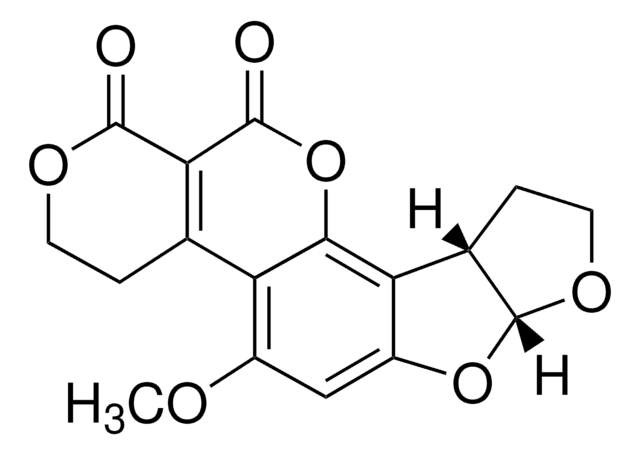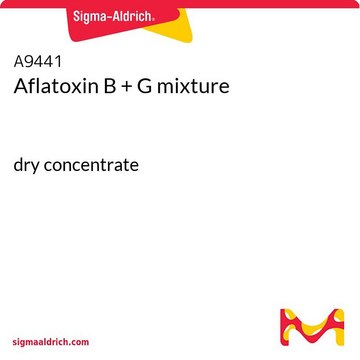A6636
Aflatoxin B₁
from Aspergillus flavus, ≥98.0% (HPLC), powder, CYP1A2, CYP2A6, CYP2D6, and CYP3A family substrate
About This Item
Recommended Products
product name
Aflatoxin B1 from Aspergillus flavus, from Aspergillus flavus
biological source
Aspergillus flavus
Quality Level
Assay
≥98.0% (HPLC)
form
powder
greener alternative product score
old score: 51
new score: 42
Find out more about DOZN™ Scoring
greener alternative product characteristics
Waste Prevention
Designing Safer Chemicals
Design for Energy Efficiency
Learn more about the Principles of Green Chemistry.
sustainability
Greener Alternative Product
greener alternative category
storage temp.
2-8°C
SMILES string
COc1cc2OC3OC=CC3c2c4OC(=O)C5=C(CCC5=O)c14
InChI
1S/C17H12O6/c1-20-10-6-11-14(8-4-5-21-17(8)22-11)15-13(10)7-2-3-9(18)12(7)16(19)23-15/h4-6,8,17H,2-3H2,1H3/t8-,17+/m0/s1
InChI key
OQIQSTLJSLGHID-WNWIJWBNSA-N
Looking for similar products? Visit Product Comparison Guide
General description
Application
Biochem/physiol Actions
Warning
standard
Signal Word
Danger
Hazard Statements
Precautionary Statements
Hazard Classifications
Acute Tox. 1 Dermal - Acute Tox. 1 Oral - Acute Tox. 2 Inhalation - Carc. 1B - Muta. 1B
Storage Class Code
6.1A - Combustible acute toxic Cat. 1 and 2 / very toxic hazardous materials
WGK
WGK 3
Flash Point(F)
Not applicable
Flash Point(C)
Not applicable
Personal Protective Equipment
Certificates of Analysis (COA)
Search for Certificates of Analysis (COA) by entering the products Lot/Batch Number. Lot and Batch Numbers can be found on a product’s label following the words ‘Lot’ or ‘Batch’.
Already Own This Product?
Find documentation for the products that you have recently purchased in the Document Library.
Customers Also Viewed
Articles
Cancer research has revealed that the classical model of carcinogenesis, a three step process consisting of initiation, promotion, and progression, is not complete.
Our team of scientists has experience in all areas of research including Life Science, Material Science, Chemical Synthesis, Chromatography, Analytical and many others.
Contact Technical Service












